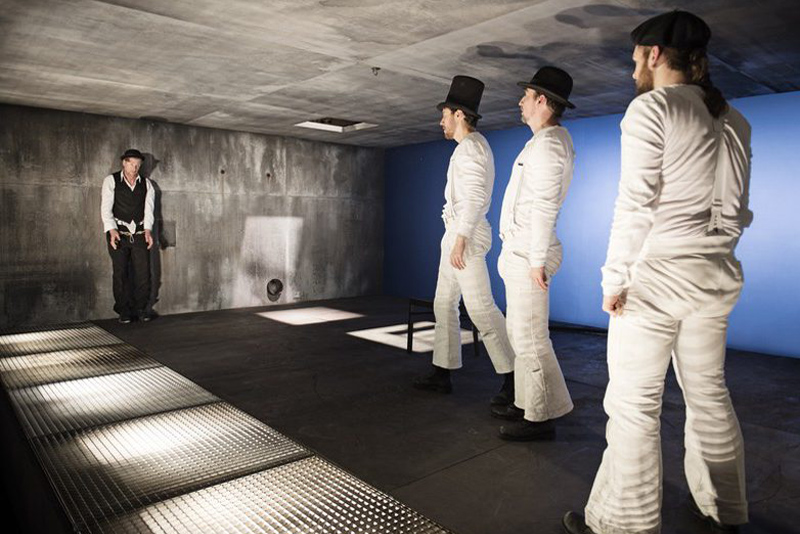“The Invisible Hand”: Ayad Akthar
Dana Rufolo in Constance
In 1776, Adam Smith wrote An Inquiry into the Nature and Causes of the Wealth of Nations, the book in which he referred to “the invisible hand”, a term having to do with income production and distribution. He little imagined that centuries later his term, interpreted ironically, would inspire a play written by the American author Ayad Akthar in 2012 and produced (in German translation) in Constance, Germany in the early spring of 2018. Under Mark Zurmühle’s direction, Die unsichtbare Hand (The Invisible Hand) mixed acts of violence with buffoonery, but it was the sombreness of gratuitous violence that set the mood, proof being that the audience the nights I attended was silent throughout, presumably contemplative. The plot of a banker being captured in Pakistan by terrorists for whom he uses his fund hedging techniques and knowledge of futures markets to make them wealthy, is a morality play of sorts with few belly laughs in it. This, Die unsichtbare Hand ends with a further sombre ironic twist when, having brought his captors immense wealth. The banker Nick Brioht appears locked forever into his basement prison alone with a dead imam: even though the last line of the play “You are free” is addressed to Nick as the terrorists depart, he finds all the exits are barred.

George Melich as Nick Bright in The Invisible Hand. Photo credit: Ilja Mess.
The actors play with consummate skill, combining good vocal techniques with the agility and body control of physical theatre. Willowy Dar (Julian Hartner) is especially interesting to watch, even if his sycophantic role leaves one with a distasteful feeling. He is ever ready to parrot a gesture or mimic the latest attitude of whoever is his superior. He is friendly to Nick but will not be loyal to him. Like everyone else on stage, his emotions and allegiances are shallow. One of the most amusing scenes in the play is when — with the bent knees of a commedia character — he follows behind Bashir, his superior among the terrorists, with a chair at the ready to catch his colleague whenever he decides to sit. Insouciant Bashir (Tomasz Robak) is as likely to be kind to Nick as to bat him with a baton. The two men develop a temporary relationship which is born out of their shared passion for acquiring wealth by dealing in money markets, but they are never friends. Indeed, nobody is anyone’s friend ever. Rather they remain in a palpable — almost unreal —state of indifference that leaves Nick emotionlessly internalizing the news that nobody will search for him or offer ransom, not even his wife, by order of the state department that is determined to not empower terrorists.
Film footage is projected at irregular intervals onto the back wall of the grey cement slabs that form Nick’s prison cell where all the action takes place. They show scenes of his being kidnapped, close-ups of his bloodied face, nightmarish images of him in one moment with his bride and in the next carrying her dead body; an entire sequence is devoted to the scene of him and his wife celebrating their young son’s birthday with gooey cake and colourful balloons; and there is even footage of his wife begging for his release (“Nick is a good man. He volunteers at a soup kitchen in his free time…. Islam allows for forgiveness. I understand…”). l am not really sure what they are meant to add except a filmic proof that Nick had a past, but one thing that is certain is they transmit no pathos. The little home videos are not nostalgic, and Nick doesn’t feel sorry for himself. He soldiers on without a tendency to panic or self-pity, and so we are not obliged to feel sorry for him.
Outstanding moments in the production include when Dar and Bashir begin to see the numbers add up, pointing to wealth accumulating in their funds. The news comes over a digital phone, and they sway, jerk, gyrate, and excitably move their digits. Then, there is the startling, precise replication of the signs of relaxation that precede rigor mortis in the imam (lngo Biermann), who is shot by the two younger men when we all expected it to be Nick who will be shot – apparently they wanted to cut the imam out of the earnings. The betrayed imam had been standing against one of the concrete cellar walls, but dead he slides into a sitting position; after several minutes his mouth falls open; a few minutes later, as his muscles continue to relax, he slumps onto his side. To see that level of realistic detail introduced into a surrealist setting and a surrealist take on what is fundamentally a dime-a-dozen news item provokes jarring resonances of alienation, which is undoubtedly the goal of Constance’s relatively new (as of 2016) head of the theatre (Schauspieldirektor) Zurmtihle — and not surprisingly, considering that the appeal of the Verfremdungseffekt has not lost its hold on German theatre directors even sixty-one years after Bertolt Brecht’s death.
The Invisible Hand premiered at the Repertory Theatre of St. Louis in the state of Missouri six years ago. Its London premiere was at the Tricycle Theatre in 2016.









